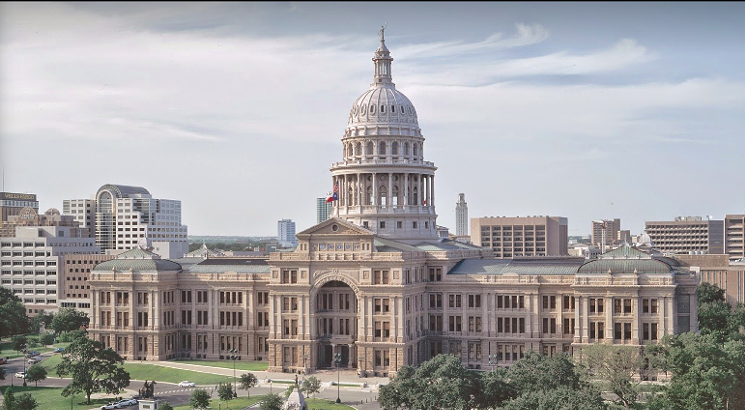
Wikicommons

Audio By Carbonatix
Texans are notorious for making their own language rules, so it’s no surprise that the pronunciation of our towns’ names is anyone’s guess. Like John Travolta reading a teleprompter or a former president’s “cofveve” messages, you could try your hardest and never be able to understand unpredictable Texas speech patterns.
Houstonians love to call their city “Youston,” and, following the same line of non-logic, the clearly Spanish-named “Celina” somehow came to sound more like “saliva.”
With German, Spanish, English, and Native American influence, Texas towns and counties follow varied phonetic rules – not to mention mispronunciations of these original terms that follow no phonetic rules and become sacrosanct. Spanish and Native American words have become Anglicized, and even words with Anglo-Saxon origin have become Texanized. In Texas, it seems the only measurement for what makes a pronunciation correct is if it sticks around long enough. Here’s a handy guide to the correct mispronunciation of some of our favorite Texas towns.
Goldthwaite
Shockingly, this name of this Mills County town is more straightforward than it seems. Don’t let the consonants scare you. With a disquieting consonant-to-vowel ratio for many Texans, the town is simply pronounced “gold-thwait.” It just rolls off the tongue.
Llano
Context clues will get a person nowhere with this town name. It looks like it would match the way we say “Plano,” (Known as “Play-no,” for those who haven’t had the pleasure), but it is not mispronounced quite the same as “Plano.” In most Spanish countries, a double “L” would suggest a pronunciation akin to an English “Y,” but still, no. This Central Texas town is actually pronounced “LAN-oh.”
Iraan
In a true stroke of girl-boss flexing, the town’s founders Ira and Anna chose to marry their names together phonetically in the naming of Iraan. So, no, it is not pronounced “eye-ran” or “ear-rahn.” The 1,000 or so people who live there pronounce the town name as if referring to a sweet Southern girl with a double-barreled name: “Ira-Anne.”
Gruene
In true Texas fashion, the name of this town near New Braunfels is simply pronounced “green,” despite the fact that the name holds the correct spelling of the German word for green, grüne (sans umlaut), which would be pronounced more like “grew-nuh.”
Boerne
This Hill Country city was named by German founders after Ludwig Börne, a German author and satirist. Employing an English presentation of the ö as oe, this city also forgoes its German pronunciation for an alternate one that may surprise English and German speakers alike. The correct pronunciation of this town is not “born” or “burn.” You ready? It’s “ber-nee,” as in Sanders.
Quitaque
The origins of this town’s name have been long debated, according to the Texas Historical Association. The word’s history, however, likely relates to the Quitaca Indians. Those attempting the word might produce a pronunciation along the lines of “kwit-uh-cue,” but the most common pronunciation is actually “kitty-kway.”
Bosque County
OK, if you think you are catching on by now, you’re not. Based on the previous example of Quitaque, you might have wrongfully convinced yourself that there’s a pattern people in Texas follow: since “que” is “kway,” Bosque County should be, “bos-kway.” That would make sense, but it’s Texas. This name comes from the Spanish word for forest, el bosque, pronounced “bos-ke” (“ke” as in “Kevin”). Now, of course, it’s actually “bus-kee.”
Balmorhea
Land developers Balcum, Morrow and Rhea sent their agent Ira M. Cole (not the same Ira of Iraan) to the land that is now known as Balmorhea. It looks like it should sound like a skin disease, but the name honors the pronunciation of the original land developers, “bal-moor-ray.”
Miami
You know it, you love it. One of the largest cities in the United States and a popular tourist destination, Miami, Florida, is well known to be “”my-am-ee.” But Texans had to put a twist on this famous name for the Panhandle town version, and could not support the long “E” in the final syllable, opting for a more relaxed pronunciation, “my-am-uh.”
Mexia
Mexia, best known as the city that does not want to claim one-time resident Anna Nicole Smith, suspends all supposed phonetic rules with its pronunciation. This town is pronounced “muh-hay-uh.” But its hospitality extends beyond its name, with the city motto consoling confused outsiders: “A great place to live, no matter how you pronounce it.”